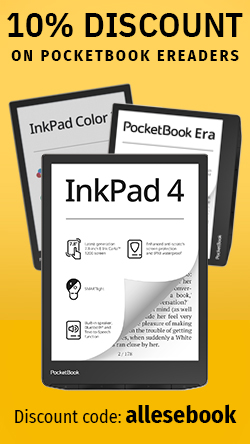Revealed: How Amazon’s eBook Empire is Reshaping the Publishing World

“Nobody! – And when it comes? – Then we’ll run away!” … Similar to the popular children’s game of chase, one could view the past and current situation in the book market and publishing industry. Initially, Amazon stood merely as a regular bookstore and mail-order company before the vast number of publishers. No one saw Amazon as a problem – why would they? But then eBooks arrived. Amazon significantly accelerated developments in the US eBook market and currently holds between 50% and 65% of the market, depending on the estimate. Right from the start of this development, Amazon’s pricing strategy didn’t exactly make friends in publishing. However, publishers had no choice but to play along. This went on until Apple entered the playing field with its iPad and announced plans to sell eBooks themselves. This, of course, also affected the eBook market. Apple offered publishers a way out from Amazon’s eBook dominance, which was gratefully accepted. This started a price war, which Amazon eventually lost – despite massive resistance. By August, these pricing agreements had even led to a lawsuit.
After narrowly escaping from this chapter, the publishing industry is now facing the next problem. Amazon is transforming from a bookstore into a publisher, dealing rather unkindly with the rest of the publishing sector. As early as 2009, Amazon quietly established its own publishing house. By August of this year, Amazon had succeeded in signing a bestselling author, outbidding Random House. Initially, they kept quiet about their exact publishing plans, but by now, the intentions behind this move are becoming increasingly obvious. According to the New York Times, Amazon plans to publish 122 books this fall – both as eBooks and in print.
Running away won’t help the publishing industry in this case.
Amazon Publishing is now made up of five separate imprints: AmazonEncore (bestsellers and new authors), AmazonCrossing (international books), Montlake Romance (romance novels), Thomas & Mercer (thrillers), and 47North (science fiction and horror novels).
Amazon seems to see itself in a somewhat different role, as the Vice President of Amazon’s book division, Russell Grandinetti, suggests that traditional publishers have become obsolete: “The only necessary people in the (book) publishing process today are the author and the reader.” However, he also notes that those who stand between these two have the risk and opportunity to utilize the new market situation. And Amazon is not hesitating to seize the opportunities presented, as seen with the hiring of Laurence Kirshbaum in May of this year. Kirshbaum is regarded as a veteran in publishing and is expected to further expand Amazon’s publishing offerings.
Amazon’s publishing recently made a major catch with the acquisition of the rights to the autobiography of US actress and director Penny Marshall. Reportedly, Amazon shelled out around $800,000, surpassing the major publishers. At the Frankfurt Book Fair, tension was already evident due to this market development, but no one wants to declare panic. “However, it is rightly observed with great concern how Amazon, similar to Google, is reaching for the whole,” a market insider reported to Der Spiegel. “This is a gigantic concentration of power.”
“Amazon holds the entire book industry hostage; first they disrupted retailers, and now it’s the publishers and authors,” says Oren Teicher, head of the American Booksellers Association, on CNN.
However, Amazon isn’t only scooping up bestselling authors; they’re also on the lookout for unknown authors and newcomers. Laurel Saville, for example, tried to publish a book through the usual distribution channels of publishers but had no luck. She states that publishers gave her a lot of praise, but ultimately no one took the bait. When she decided to self-publish the book with a print run of 600 copies at a price of $2,200, Amazon became aware of the author after a magazine review. Now, the book is being published by Amazon with a new cover and title.
But Amazon isn’t only operating differently here. With the “Kindle Direct Publishing” service, they offer all interested authors the opportunity to self-publish a book within the Kindle ecosystem as an eBook. To make this appealing, Amazon releases new success stories from the Kindle sector more or less regularly. The most successful authors can call themselves “Kindle Millionaires.”
Amazon is already active in the German book market as well. They’ve secured the US rights to the historical novel “The Hangman’s Daughter” by Oliver Pötzsch. The book was translated into English and distributed in digital form for the Kindle – and successfully: Amazon has already sold 250,000 eBooks.
The upheaval in the publishing industry is not unfounded, as seen with Harry Potter author J.K. Rowling. She prefers to publish the wizarding eBooks on her specially created Pottermore website, instead of going through the publishing route, and remains in direct contact with readers.
Amazon also grants its authors direct contact and greater input. Recently, Amazon launched a program allowing direct communication between authors and fans and providing authors access to Nielsen sales statistics. Typically, authors have to wait six months (or longer) for sales statistics presented by publishers. With Amazon, however, an author only needs to register on “Author Central” to gain direct access to the data.
So far, publishers are holding back on public criticism. However, this doesn’t mean they are pleased with recent developments. In September, we reported on Kiana Davenport, whose novel’s release was suspended by the publisher due to the self-publishing of two short story collections on Amazon.
This entire situation is currently primarily affecting the US market. The US book industry was caught completely unprepared by this development, as it is entirely new and unprecedented. It will be interesting to see if European publishers brace themselves and develop their own strategies against Amazon’s dominance, or wait until it’s too late. They should have enough time to consider the situation…
